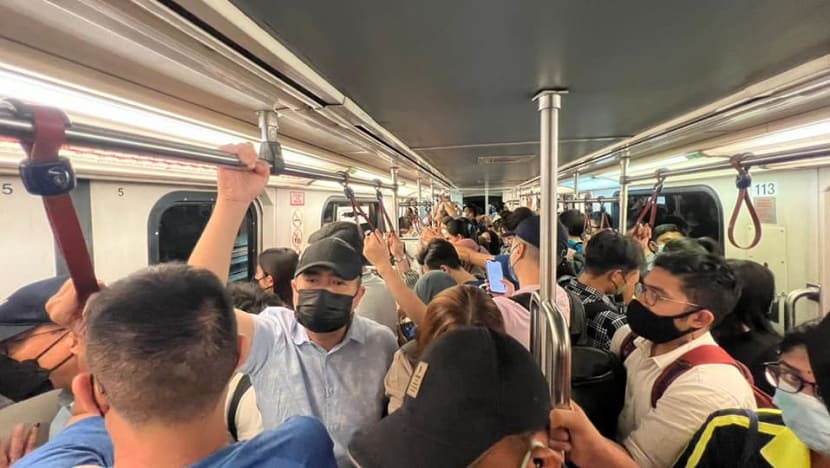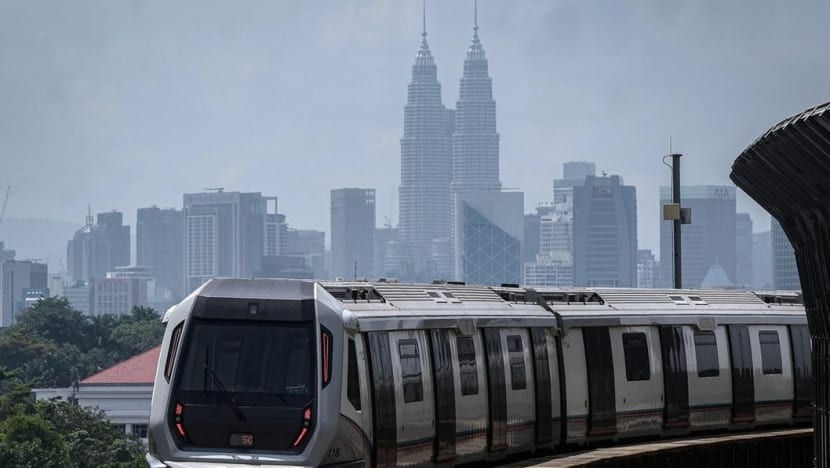Commentary: ‘Undercover’ ministers in Malaysia a breath of fresh air but not quite the winds of change
A few ministers in Prime Minister Anwar Ibrahim’s new Cabinet are providing citizens with a breath of fresh air as they conduct surprise visits to see what ails public services, but the winds of change have not gathered sufficient force for true reform, says this academic.

Malaysia's Transport Minister Anthony Loke (wearing a black cap and mask) commuting on Selangor’s Light Rapid Transit during peak hours on Dec 5, 2022. (Photo: Facebook/Anthony Loke Siew Fook)
SINGAPORE: The first place that Anthony Loke visited his first day as Malaysia’s new Transport Minister was not his office but a train station in Selangor.
Wearing a black cap and mask with plain clothes and trousers, he stood among the commuters to experience what a typical citizen does during peak hours. Service interruptions, breakdowns and delays are commonplace in Selangor’s Light Rapid Transit (LRT) system, with a serious six-day shutdown at 16 LRT stations just a few weeks before.
Loke went unannounced, accompanied by two assistants.
“The conditions in the train were very cramped and certainly uncomfortable to (sic) passengers,” he posted on social media. Three days later, he met the LRT’s management team to directly discuss how to resolve these problems.
This was not the first time Loke had gone on an undercover mission to spot check Malaysia’s public transport system. In his previous tenure (2018 to 2020) as transport minister, he had visited the LRT and the commuter rail system to get firsthand, unfiltered insights into the state of operations.
In his new tenure, he has done this almost weekly and even earned the moniker “undercover minister”.
ROSY PICTURE OF REALITY
This hands-on approach is like blusukan, a practice popularised by Indonesia’s President Joko Widodo. A Javanese term, loosely translated as “making an entrance”, blusukan originated from a habit apparently of a ruler of Surakarta, King Pakubuwono V (1820-1823).
As the mayor of Solo, Jokowi used blusukan to listen closely to his constituents and solve community problems effectively. It is a practice he continued as Jakarta mayor and even as president.

The author, in conversations with Indonesian voters, learned that Widodo’s blusukan was aimed at combatting the culture of “asal Bapak senang” (ABS), translated as “as long as my boss (minister) is happy”, used euphemistically by subordinates to mean they delivered only good news to their bosses. The term was reportedly used frequently during Indonesia’s first president Sukarno’s tenure, when his followers presented only rosy reports to him.
This is arguably not too different from the political or bureaucratic culture that exists in Malaysia. It is tempting for officers and civil servants around the ministers to present just a rosy or positive picture of reality because they fear that doing otherwise may attract blame or risk their being put in their superior’s bad books.
This is more so for a country that has a high Hofstede power distance index like Malaysia, created from the dual hierarchical forces of historical colonialism and psychological feudalism (meaning absolute loyalty from subordinates, even when potentially violating established norms or values of society). Malaysia is a country where hierarchical order needs no justification, the ideal boss is a benevolent boss, and challenges to the leadership are not well received.
GOING TO THE GROUND UNANNOUNCED
A recent example illustrates the above argument. At the height of the COVID-19 pandemic, former prime minister Muhyiddin Yassin’s visits to aid distribution centres and hospitals were choreographed to make everything seem under control. This was even when photographs and videos of the emergency department at the Tengku Ampuan Rahimah Hospital in July 2021 looked like footage from a disaster movie.
Similarly, ministers who officiate flood relief efforts at high-profile events dilute the plight of flood victims, as they seem to spend more time in their offices or meeting rooms than on the ground.
Anthony Loke must be aware of this irony. In an interview at Astro Awani on Jan 6, he told the host that if he made an official visit somewhere, his entire experience would be staged and everything he used or saw would be at its best operational level.
Loke likened this to “Potemkin villages" (in Soviet Russia), as such staged visits obscure the significantly worse lived experiences of everyday citizens and public transport users.
By also going to the ground unannounced, Loke’s colleague Health Minister Zaliha Mustafa learned about the long wait times and inadequate facilities at government clinics and hospitals directly from patients; and Local Government Development Minister Nga Kor Ming discovered that the public toilets at Independence Square have broken taps, no soap and cracked ceilings.
With this type of hands-on experience, a minister’s views in policy discussions would carry more weight when he or she pushes for viable solutions.
THEORETICAL OR SUPERFICIAL BENEFITS?
However, it bears asking if the benefits from such incognito ground visits are more theoretical or superficial than real. Beyond the rare spectacle of seeing a down-to-earth, on-the-ground minister, it might be an exaggeration to assume that these practices could bring about deep-seated cultural changes.
It is likely that most tangible changes any Malaysian minister’s blusukan would bring about might be just quick fixes that would have easily been made anyway.
Even if we assume that deeper changes in Malaysian political culture can be made, such practices by ministers may be too limited, selective, and ultimately unsustainable. Experiencing the full journey of a daily commuter might be overly time-consuming for a minister with a full agenda.
Despite all this, even if Malaysians get to see a humble politician doing blusukan occasionally, that might still be worthwhile. The past few turbulent years in Malaysian politics are sordid reminders of the deep double standards between political elites and the Malaysian public.
Ministers who can show that they understand some of what voters feel would fare vastly better than those who continue to stay in their comfortable abodes, or kayangan, a derogatory reference to elites who live in the “heavens”, out of reach from the rest of the country.
James Chai is Visiting Fellow of the Malaysia Studies Programme at ISEAS – Yusof Ishak Institute. This commentary first appeared on the Institute's blog, The Fulcrum.


















